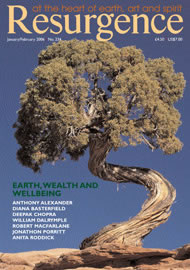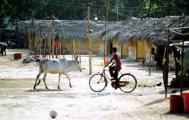EVEN BEFORE WE duck under the low entrance to a tsunami survivors' camp in Kalmunai, a remote town on the east coast of Sri Lanka, a message has buzzed through the camp: foreigners are on their way.
We've learned what to expect and explain that we are not aid workers, that we can only talk with them and perhaps share their stories with others. "The government hasn't given us land for the new houses they promised us"; "Our washwater-pools at the back of the camp stink and breed mosquitoes"; "No-one has replaced all of the fishing boats, nets, sewing machines and bicycles that were lost…"
At camp after camp around the island, this has been the story. As the one-year anniversary of the tsunami approaches, the emergency relief effort has met the very basic needs of nearly all the tsunami survivors, but the longer-term process of restoring livelihoods and resettling communities continues at a crawl. Most people still need permanent shelters, and many have no way to generate income. They are in an odd limbo, surviving but still in need.
"It wasn't like this before," says Kumari, a Sri Lankan humanitarian worker who is introducing us to residents of camps in this area. "These people are fisher folk. They traditionally have very strong communities - they have always relied on each other and looked inside the village when they need something."
Again and again we hear a common fear echoed: through poorly co-ordinated and hastily planned programmes that force tsunami survivors to rely on handouts for daily survival, many well-intentioned international non-governmental organisations (INGOs) may be wearing away the interdependence the communities rely on for survival. The prospect becomes even more disheartening when we learn that methods to promote communal self-reliance were already in place but, sadly, ignored by the INGOs. The threat of dependency is as old and persistent as humanitarian aid itself.
WE ARE IN the Ampara District of Sri Lanka, one of the most remote regions of the island and already struggling with poverty and conflict when the tsunami struck. The tsunami inflicted more damage here than in any other district.
Community development programmes in the Ampara district have long been the work of community-based NGOs. Many successful organisations here have developed methods that declare empowerment and sustained autonomy the primary goals in the long process of rebuilding these villages after years of conflict.
A nearly universal message from local NGOs is that you can't improve people's lives simply by giving them things. They have learned by experience that in order to effect lasting change they must enable communities to help themselves.
Mr S. Senthurajah, founder and Coordinator of the Social Welfare Organisation of Ampara District (SWOAD), is one of Amapara's most experienced proponents of participatory community development. His organisation is the largest local NGO in the district and runs programmes with partners like Save the Children, CARE International and OXFAM.
"Our programmes develop over the years," says Senthurajah, "but they are sustainable because communities make their own decisions, and through this, they begin to take ownership over their own destiny."
He worries that the progress his organisation has made is being eroded by the INGOs' poorly co-ordinated reconstruction programmes. He explains that he does not wish to scapegoat INGOs. He believes they have done years of deeply beneficial work for the people of Sri Lanka. The combination of local knowledge and foreign expertise plus foreign resources and local materials, he says, forms a strong mechanism for change, but they can often overlook the real needs of local people.
MANY LOCAL ORGANISATIONS are now applying their own participatory approaches to community development in their tsunami recovery programmes. Mahashakti, a thriving savings and micro-lending organisation, originally came together in 1992 when the front line of the civil war first advanced into Ampara, stripping thousands of residents of their livelihoods and driving them from their homelands. Founder and current president of Mahashakti, Mr Manivasagam, decided to do whatever it took to help these people.
To call Mahashakti a typical micro-lender oversimplifies the holistic scope of its approach. In order to get a loan, individuals must propose a business plan and participate in a savings programme. They receive training in whichever area they intend to work in, such as small business economics, agriculture, animal husbandry, candle making or leatherworking. Each of the twenty communities Mahashakti serves has a local quite autonomous office with a staff of 'animators' who manage the training, assessment, and advising in their own neighbourhoods.
A bit like social workers, the animators know the stories and challenges of every family living in their areas. They are now applying the same techniques they developed for war refugees to tsunami refugees in eight temporary communities throughout their jurisdiction.
Manivasagam is concerned that because some INGOs are offering quick, obligation-free grants to tsunami survivors, some tsunami-affected participants are dropping out of loan programmes. "Free money may be attractive, but we have learned over the years that such grants rarely make long-term improvements." Western donors often don't understand the process of participatory development. It rarely fits neatly into a fiscal year, and the benefits to the community are not easily measured.
Senthurajah reminds us that "when a huge donor agency makes a grant, those who give must understand the organisations and programmes they finance. They must be sure that their money will be put to the best long-term use and do no harm. It is their responsibility."
Chris Necker, the newly appointed Humanitarian Assistance Coordinator of CARE International, admits that full participation has not always been a priority of the relief effort. "The humanitarian community are driven by their donors at times. Donors give away a lot of money, and they want to see results."
He says, however, that at CARE they are beginning to make some changes. "We are trying to be more process-oriented. We want to make sure communities are involved in all decisions, but that takes time. If the process is going to work, it can't just be about handouts. We have to instil a sense of ownership in the beneficiaries and not create a sense of dependency."
AT THE END of our afternoon with Kumari, she takes us to the 40th Mile Post Refugee Camp, which she helped to build. They welcome her like a member of their extended family. She checks in with the elected leader and asks about progress on a new library and study hall they are building for the school-children in the camp.
As we talk to her, we understand that Kumari is a refugee herself. After five years as a peace worker for Quaker Peace and Service and co-ordinator for peace-building with CARE International, she left the INGO world to work as a freelance humanitarian. She dropped her life in Colombo, the capital city, to work on tsunami relief and recovery. "I left the INGOs because I felt I could not really help people within those constraints. Now I know I must approach things differently. I go and live with people. I try to understand them. And if we understand something about each other, and if we find a way that I can help them help themselves, then we do it."
She sees many INGOs as self-aggrandising, as showing off for their donors to compete on the international market for humanitarian funds. She says that they are more interested in photo-opportunities and marketing strategies than they are in actually helping the people of Sri Lanka.
"Why do all of these INGOs have to put labels on everything? Shelters, water tanks, toilets…The only things they haven't stamped are people's foreheads! Every time you use something, you remember that you didn't earn this, that you are indebted, that you are a victim."
"This is victimising victims," she says. "No-one seems to recognise that the people have the strength to rebuild for themselves. If you really want to help someone who has lost everything, you do not just come in and start handing them what you think they need, you have to help them get their power back."
Though Kumari reserves her harshest criticism for the nation's politicians, whom she calls "dead to the needs of the people", she is relentless in her criticism of the world of professional humanitarian assistance. It is a world that she sees, at its worst, as driven by the same fundamentals as corporate capitalism, and at its best, as a convoluted structure of poor planning and culturally inappropriate strategies.
"They do not understand the people they are dealing with," she tells us. "They do not understand the way that people think of themselves as community members here. It is not the same as how people think of themselves as individuals in the West. Even when we talk about human rights, we talk about community rights rather than individual rights."
She asks us to imagine that we have lost all that we know to a natural disaster. She tells us to imagine that we have watched the people we love and the means of our survival wash away in a matter of minutes. "Do you feel the helplessness?" she asks. "Can you even begin to understand how disempowering it is to have everything ripped away from you?"
Now she tells us to imagine that soon after such a disaster, a group of rich foreigners arrives and tells us that they have come to rebuild our lives for us. "Out of all of things that you have lost," she says, "your dignity and your sense of self-worth are what you will need most to begin again. No-one can give you that. They can only give you the tools and materials that you need to help yourself and your community. Empowerment is not something that drops on you from above - it is already within you. You just have to facilitate it, to let it come out."
The 40th Mile Post Camp seems almost to glow with the energy of empowerment. Not a camp at all, really, but a village the residents here have fought for and laboured to keep intact. They live by the same principles that have held them together for generations.
Recovery, they insist, will be on their own terms. "One NGO offered to donate complete sets of kitchen items, but only to ten of our sixteen families," says Margaret Bartlett, the community leader, "so we took nothing from them."
As the long recovery process continues and organisations evaluate their continuing work, we hope that more and more will fight the impulse to impose quick fixes. Calling on local wisdom to encourage participation and nurture empowerment may be a messy, slow process, but it is invariably more powerful than giving people what you assume they need. o
Shaun Kadlec and Arthur Rhodes are writers and film-makers.







